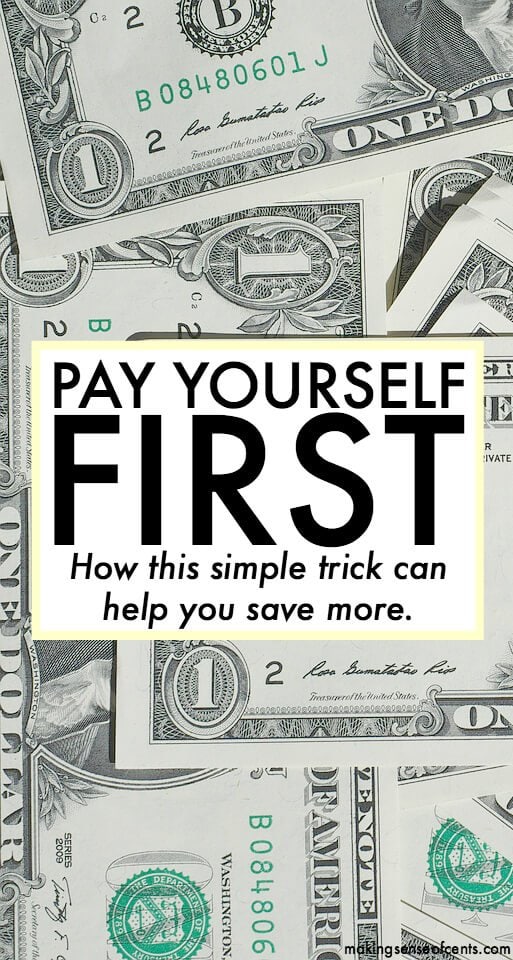 How much money are you currently saving each month? What if I told you that you may be able to save even more and all you have to do is pay yourself first?
How much money are you currently saving each month? What if I told you that you may be able to save even more and all you have to do is pay yourself first?
Seems simple enough, yet not many do this. Many families just save whatever amount they have left over at the end of each month.
Yes, many bills and expenses are necessary each month, but there may also be a lot of unnecessary spending going on in your life as well.
Spending money isn’t a bad thing, but if you aren’t saving for your future as much as you should then you need to reevaluate what you are doing.
Paying yourself first before you pay for your monthly expenses may be a scary thought. No one wants to over withdraw from their checking account or be unable to pay their monthly bills.
However, your future is just as important too, so it is much better to think about saving money as a need as well instead of something that can be pushed aside.
Sadly, there are many out there who do not save enough money when preparing for retirement. According to Zacks Investment Research, 72% do not save enough for retirement each month.
Also, according to a different survey done by Bankrate.com, 36% of people in the United States have absolutely NOTHING saved for retirement.
These numbers are very alarming.
I believe that if more paid themselves first, that retirement and other financial goals wouldn’t seem so impossible.
Below are some of the things you may want to think about when it comes to paying yourself first.
Here’s how to pay yourself first.
What exactly does it mean to pay yourself first? What is an example of pay yourself first?
In case you read all of the above and you still are not sure what “pay yourself first” means, some background information may be needed.
Paying yourself first is when you put money into savings as soon as you receive your paycheck. Or, I know some who “pay themselves first” by putting extra money towards their debt as the first thing they do each month. There is no right or wrong answer – basically just pay off or save towards whatever you think you should be doing and do it FIRST.
This is the first thing you do with each paycheck – you don’t even pay your other bills first. Try to think of savings (or debt) as the very first bill you have to pay each month.
It may allow you to save more money and cut back on unneeded spending.
As I said at the beginning, you may be able to save more money if you just pay yourself first. Learning to budget with just the amount of money that you have left over after you pay yourself first each month can help you save more money. Yes, it may be difficult at first but you will get used to living on less money.
You may have to do some cutbacks with your budget or find ways to make more money, but by only having a limited amount of money to spend each month, you will find that you will watch your spending more closely.
This may allow you to really see what is a need and what is just a want.
Related posts:
- 75+ Ways To Make Extra Money
- How To Live On One Income
- 10 Ways To Make Money Online From The Comfort of Your Home
- 10 Things I’ve Done To Make Extra Money
- Ways To Make An Extra $1,000 A Month
- How To Save Money – My Best Money Saving Tips
Paying yourself first can help you prepare for the future.
Your future is important. By waiting to save until the end of the month and just saving whatever you have leftover, you are not prioritizing what is important in life – your future.
By paying yourself first, you will think about your future more and you will make it a priority.
It doesn’t have to be difficult to pay yourself first.
Once you get into the routine of it, it can be quite easy to pay yourself first.
Here are my tips so that you can pay yourself first:
- Take a look at how much you are currently saving and spending each month. Start tracking your spending a little more closely and see how much of that is actually unneeded. Calculate how much money you should be saving each month and set that aside at the beginning of each month.
- Make it automatic. To make it easier and to simplify your finances, you may want to set aside a specific savings amount each month automatically.
- If you feel uncomfortable with paying yourself first, then you may want to find ways to cut your budget back or make more money.
Do you pay yourself first? Why or why not?

Leave a Reply
I just started to pay myself first. My company has a saving scheme that deducts whatever amount you want from you paycheck and then they pay it out every October. So I decided to save my pay increase and the same amount as my furlough. It ends up being around $492 per month and when pay out time comes, I will be getting $5,900. My goal is to use this money as my starter emergency fund. Taking advantage of this saving scheme has made saving money alot easier and I wish I would have started sooner.
Oooh Sylvia, this is an incredible idea! I wish my company had the same type of set up. It’s so much easier to save when it automatically comes out of your paycheck. Even easier than setting up the auto deposit with your bank. I may set up some more automations through my paycheck vs the bank in 2016 to see if I can accelerate my savings.
Good luck Latoya!
So you are giving your company an interest-free loan for up to a year? Sounds like a great idea…for your company.
Different saving methods work for different people 🙂
I understand. It just drives me nuts when people leave free money on the table. It’s like Dave Ramsey’s debt snowball. I know for some people those “faster wins” are helpful, but it can cost them hundreds (thousands?) of dollars in extra interest. Another one is people that intentionally deduct too much from their paychecks so they get a bigger tax refund. Free loan to the federal government? Argh!
Oh well, the main thing is people are saving money (or paying down debt).
I understand exactly what you mean Travis. The next step is for people to realize that they could be earning interest. However, like you said, at least people are saving 🙂
I’m sorry, I should have mentioned that my job doesn’t actual hold the money. When it is deducted it is saved by a third party and it is earning interest during the year.
That is awesome!
Awesome!
Not kidding I have a post about this scheduled for a couple months from now!! I think that means it’s THAT important. 🙂
Yes!
We have been “paying ourselves first” for the past few years by making extra debt payments as soon as we get paid, and it’s awesome- we are set to be done with all non-mortgage debt by summer 2016. We never could have done it if we hadn’t been paying ourselves first this way!!!
Great job!
That retirement savings number is SO scary. We have made plenty of mistakes with our money, but I’m relieved to know that we’ve got a semi-plush amount of money saved for retirement.
Good job Laurie!
Awesome!
Yes, exactly!
Great post as always! I have been doing this for quite some time and I have it on automatic. I save so much doing this!
Good job!
Thanks!
Yep, when the paycheck comes, I sit down with an excel sheet. (Because I’m nerdy like that.)
I take our current balance and subtract the various expenses. Then I deduct all of our contributions to sub-accounts like emergency fund, car, insurance, etc. Whatever is left over after that gets put into the main savings account.
That makes sure that our goals are being met *and* we’re still bulking up the main account.
Nice!
Automating my finances has been a huge win. I love the fact that I’m saving for retirement without even thinking about it.
Yes, I agree!
This method was so hard for me to adopt when I first started my retail business. I was just investing every dollar I received to grow the business but realized I was not paying myself even when I could. I started paying myself a monthly amount and I realized my business still ran as usual with room to grow. This is a great budgeting tip and it works!
Thanks Jen!
An amazing article. Your posts are an inspiration for my personal and financial growth. Thank you for this.
Thanks Marko!
It’s my pleasure 😉
Good advice Michelle, although probably very obvious to most of the readers here 😉
In my case I don’t automate it because I like that moment at the end of the month where I manually send some money to my brokerage account 🙂
Thanks!
Yes!
Teaching children this rule is also helpful. If my grandchildren receive money as a gift or earned for extra chores, they are supposed to put 10% aside to save for something they want later.
Yes, teaching children is extremely helpful.